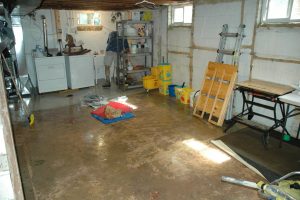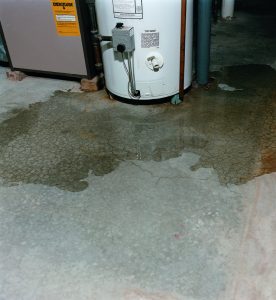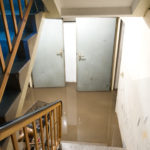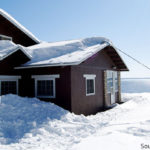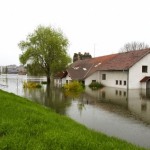Because there are so many possible sources for water damage, it is almost impossible to prevent it altogether. But when natural disasters occur or incredible amounts of rain seep into the foundation, they will eventually find their way to the basement. Even if you are lucky to have a sump pump, it will be no match to the gallons of water flowing into your basement by the minute.
As soon as you notice any amount of water damage in your basement, never hesitate to contact a flood cleanup professional. Contacting your local restoration company right away will save both time and money in preventing additional damage while quickly extracting the water and drying out the affected materials.
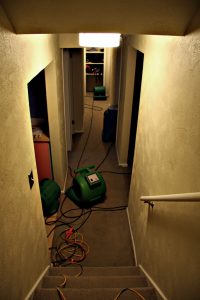
But before they arrive, here are some steps you can take on how to handle a flooded basement:
- Contact professional help. Call your local local restoration professional for emergency water damage restoration and flood cleanup.
- Call your insurance company. Even if you don’t have flood insurance, it still wouldn’t hurt to call and ask for help. Otherwise, don’t hesitate to file a claim and have your adjuster come out right away.
- Shut off the power. Before doing anything else, make sure that the main power is off, including the gas, to protect your safety. If you aren’t sure how to do it yourself, you can call a licensed electrician for help.
- Find the source of the water. Finding and locating the source of the damage, or where the water is entering will save both the plumber, and your water damage repair professional time in the cleanup process. But if you can cut off the source yourself, do so right away to prevent as much additional damage as possible.
- Stay away from sewage water. If at any time your toilet had overflowed or you had a sewage backup, stay away from the water. Because it contains harmful bacteria and pathogens, it must be handled professionally with personal protection equipment.
- Check the sump pump. All sump pumps are located in the lowest part of the basement. If it isn’t working, you may have to replace it, or call your plumber to see if they can fix it.
-

Try to cut off the source of the water from the flood after turning off the power Save your belongings. If any of your personal items are submerged under the floodwaters, don’t hesitate to pull them out immediately. Lay them out flat in a dry area, keeping them out of direct sunlight to prevent warping and discoloration.
- Remove as much water as possible. If possible, try to remove the water by using a mop and bucket. Don’t be afraid to ask others for help.
- Avoid touching electrical items. This includes lights, TVs, fans, stereos, and any other water-damaged device.
What to Do After Extracting the Water
After the water damage restoration professionals arrived and extracted the majority of the water, the property may start to smell musty and develop mold growth if the affected materials aren’t quickly dried out. Here are some steps you can take to prevent the fungus from growing in your basement.
- Sanitize everything. Even if the affected surfaces are still wet, mold thrives off of bacteria. Be sure to wipe down everything from top to bottom.
- Remove soiled materials. Try to remove as much loose soiled building materials as possible. This includes drywall, insulation, dirt, etc.
-

You may need to replace your water heater if it is leaking in the basement Ventilate the property. As long as it is safe to do so, turn on an area fan and open all windows, doors, closets, and drawers to increase the air flow throughout the property. Try to dry out the affected materials by placing them in a dry area. Hang up any area rugs, clothes, and blankets to allow them to dry thoroughly.
- Monitor and check for mold. Just be careful as the spores can trigger severe allergic reactions and other negative health effects. But if you do find any cases, don’t hesitate to call a mold removal professional.
- Call a plumber. As long as the majority of the water has been extracted out, you may need to call a plumber, depending on the source of the damage. For sewage backups, frozen and burst pipes, leaking pipes, broken appliances, and water hoses, calling them sooner rather than later would be most beneficial.
Local Flood Cleanup Professional
When encountering a flooded basement, don’t hesitate to call a restoration company, even if you find the problem at 3 AM. But finding a company that is licensed and experienced is essential during the repair process. They must also be available 24/7 to take your call and respond immediately if you have any problems during the drying process.
When searching, make sure the water damage restoration provider is available 24/7, trained, licensed, and experienced. They should first extract the water, then fully inspect the damage, set up the drying equipment, and work with your insurance carrier, if needed, during the claims process. Ultimately, they will ensure your basement is rid of all water, moisture, and mildew after an efficient and effective service.
